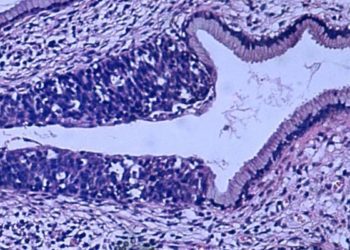Adjuvant metronomic capecitabine improves survival in patients with locoregionally advanced nasopharyngeal carcinoma
1. Adjuvant capecitabine resulted in fewer instances of disease recurrence and death compared to standard therapy.
2. Overall and failure-free survival at 3 years was significantly greater in the capecitabine group.
Evidence Rating Level: 1 (Excellent)
Study Rundown: Nasopharyngeal carcinoma is a form of invasive head and neck cancer with a favorable prognosis when managed with current chemoradiotherapy regimens. However, while many patients achieve clinical remission, the risk of relapse remains high. Timely and effective management, using adjuvant therapy, may help to mitigate said risk. This randomized controlled trial aimed to assess the safety and efficacy of metronomic capecitabine – a form of adjuvant therapy – to minimize recurrence of high-risk locoregionally advanced nasopharyngeal carcinoma. The primary outcome for this study was time to recurrence (distant metastasis or locoregional recurrence) or all-cause mortality, while key secondary outcomes included overall survival, failure-free survival, and health-related quality of life (HRQOL). According to study results, capecitabine resulted in decreased recurrence or all-cause mortality and increased failure-free survival at 3 years, compared to standard therapy. This study was strengthened by a multicentre randomized controlled trial design that evaluated outcomes for up to 3 years after randomization. It provided valuable insight into the use of metronomic capecitabine for high-risk locoregional nasopharyngeal carcinoma.
Click to read the study in The Lancet
Relevant Reading: Tucatinib, Trastuzumab, and Capecitabine for HER2-Positive Metastatic Breast Cancer
In-depth [randomized controlled trial]: Between Jan 25, 2017, and Oct 25, 2018, 675 patients were assessed for eligibility across 14 hospitals in China. Included patients were between 18 to 65 years of age with histologically confirmed nasopharyngeal carcinoma (stage III-IVA), no previous locoregional disease or distant metastasis, and an Eastern Cooperative Oncology Group (ECOG) score of 0 or 1. Altogether, 401 patients (201 in capecitabine group vs. 200 in standard therapy group) were included in the intention-to-treat (ITT) analysis. Baseline characteristics were similar between both groups.
The primary outcome of disease recurrence or death was lower in the metronomic capecitabine group (n=29, 14%) than in the standard therapy group (n=53, 26%). With regard to key secondary outcomes, overall survival at 3 years was greater in the capecitabine group (93.3%, 95% confidence interval [CI] 89.7-97.1) compared to the control group (88.6%, 95% CI 84.2-93.2; p=0.018). This was also the case for 3-year distant failure-free survival (82.1%, 95% CI 76.8-87.8 for capecitabine vs. 89.4%, 95% CI 85.1-94.0 for standard, hazard ratio [HR] 0.52, p=0.014) and 3-year locoregional failure-free survival (87.8%, 95% CI 83.1-92.7 for capecitabine vs. 92.6%, 95% CI 88.7-96.6 for standard, HR 0.50, p=0.041). However, the proportion of grade 3 adverse events was greater in the capecitabine group (35 of 201, 17%) than in the standard group (11 of 200, 6%), with the most common adverse event being hand-foot syndrome (n=18, 9%). There were no treatment-related deaths. Findings from this study suggest that adjuvant capecitabine may improve survival and reduce mortality in patients with high-risk nasopharyngeal carcinoma.
Image: PD
©2021 2 Minute Medicine, Inc. All rights reserved. No works may be reproduced without expressed written consent from 2 Minute Medicine, Inc. Inquire about licensing here. No article should be construed as medical advice and is not intended as such by the authors or by 2 Minute Medicine, Inc.







